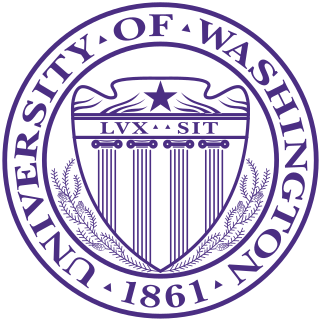
The University of Washington is a public research university in Seattle, Washington, United States. Founded in 1861, the University of Washington is one of the oldest universities on the West Coast of the United States.
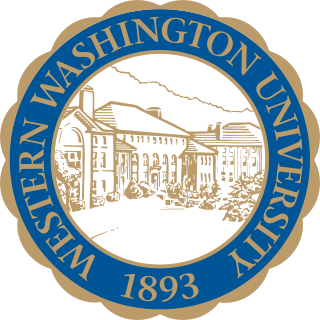
Western Washington University is a public university in Bellingham, Washington. The northernmost university in the contiguous United States, WWU was founded in 1893 as the state-funded New Whatcom Normal School, succeeding a private school of teaching for women founded in 1886. The university adopted its present name in 1977.

Washington State University is a public land-grant research university in Pullman, Washington. Founded in 1890, WSU is also one of the oldest land-grant universities in the American West. With an undergraduate enrollment of 24,278 and a total enrollment of 28,581, it is the second largest institution for higher education in Washington state behind the University of Washington. It is classified among "R1: Doctoral Universities – Very high research activity".

Vanderbilt Peabody College of Education and Human Development is the education school of Vanderbilt University, a private research university in Nashville, Tennessee. Founded in 1875, Peabody had a long history as an independent institution before merging with Vanderbilt University in 1979. The school is located on the Peabody Campus of Vanderbilt University in Nashville. The academic and administrative buildings surround the Peabody Esplanade and are southeast of Vanderbilt's main campus.
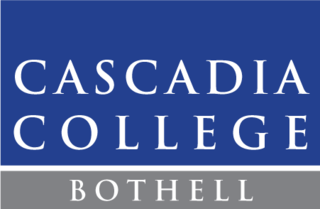
Cascadia College is a public community college in Bothell, Washington, on a shared campus with the University of Washington Bothell. Established in 2000, Cascadia was built to serve the cities of Bothell, Woodinville, Kirkland, Kenmore, Duvall, Carnation, Sammamish, Redmond and other smaller communities within the greater Seattle area.
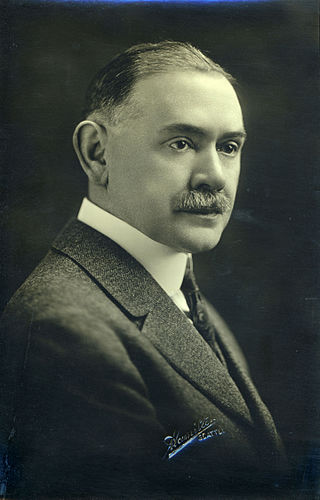
John Nathan Cobb was an American author, naturalist, conservationist, canneryman, and educator. He attained a high position in academia without the benefit of a college education. In a career that began as a printer's aide for a newspaper, he worked as a stenographer and clerk, a newspaper reporter, a field agent for the U.S. Fish Commission (USFC) and its successor the U.S. Bureau of Fisheries, as an editor for a commercial fishing trade magazine of the Pacific Northwest, and as a supervisor for companies in the commercial fishing industry. He took photographs during his extensive travels documenting scenes and people. In 1919, Cobb was appointed the founding director of the College of Fisheries at the University of Washington (UW), the first such college established in the United States.
The Associated Students of the University of Washington (ASUW) is the student association at the University of Washington. It is funded and supported by the University's Services and Activities Fee with which it provides services that directly and indirectly benefit student life. The ASUW consists of over 80 student employees and 500 volunteers, and the organization spends approximately $1.5 million annually to run events, lobby the legislature, and fund various Registered Student Organizations as they put on their own programs.
The University of Washington Department of Global Health is a department jointly run by the School of Medicine and the School of Public Health at the University of Washington in Seattle, Washington. Its aim is to provide a multidisciplinary venue to address issues of global health at the university.

The College of Education is the undergraduate and graduate education school of the University of Illinois Urbana-Champaign. It was founded in 1905 and took on its current name in 1918 after previously being known as the School of Education. The college offers undergraduate, graduate, and online programs in areas including elementary education, early childhood education, special education, and Educational Organization and Leadership. It began with six departments; three of them merged and formed the largest department in the college. All departments offer masters and doctoral degrees. However, only two departments offer undergraduate degree programs: Special Education and Curriculum & Instruction. The college also offers 16 online programs. Students seeking an undergraduate degree in the college must meet the minimum graduation requirement set forth by the university. To obtain a certification, students must also meet the requirements of the Council on Teacher Education, a professional educational administration at the University of Illinois. The total enrollment is 1,361 students as of 2015.
The Michael G. Foster School of Business at the University of Washington is the business school of the University of Washington in Seattle. Founded in 1917 as the University of Washington School of Business Administration, the school was the second business school in the Western United States.
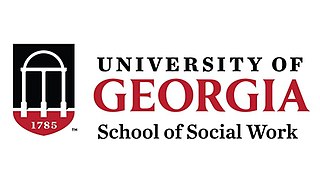
The University of Georgia School of Social Work (SSW) is a college within the University of Georgia (UGA) in Athens, Georgia, United States.

The University of Wisconsin–Madison School of Education is a school within the University of Wisconsin–Madison. Although teacher education was offered at the university's founding in 1848, the School was officially started in 1930 and today is composed of 10 academic departments. U.S. News & World Report in its 2024 Best Education Graduate School rankings rated UW-Madison's School of Education No. 1 among public institutions. For the past 11 years, it has been ranked in the top five schools of education in the country. For 24 of U.S. News’ past 25 rankings, it has been in the top 10. UW–Madison is tied for the top spot with Teachers College, Columbia University. In addition to its No. 1 overall ranking, 10 graduate programs housed within the UW–Madison School of Education were highly-rated by U.S. News. That includes a No. 1 ranking for the Educational Psychology program.

The Information School is the information school of the University of Washington, a public research university in Seattle, Washington. Formerly the Graduate School of Library and Information Sciences since 1984, the Information School changed its focus and name in 2001.

Popular music pedagogy — alternatively called popular music education, rock music pedagogy, or rock music education — is a development in music education consisting of the systematic teaching and learning of popular music both inside and outside formal classroom settings. Popular music pedagogy tends to emphasize group improvisation and is more often associated with community music activities than fully institutionalized school music ensembles.

The College of Built Environments is the architecture and urban planning school of the University of Washington, a public research university in Seattle, Washington.

The University of Wisconsin–Madison is a public land-grant research university in Madison, Wisconsin, United States. Founded when Wisconsin achieved statehood in 1848, UW–Madison is the official state university of Wisconsin and the flagship campus of the University of Wisconsin System. It was the first public university established in Wisconsin and remains the oldest and largest public university in the state. UW–Madison became a land-grant institution in 1866. The 933-acre (378 ha) main campus, located on the shores of Lake Mendota, includes four National Historic Landmarks. The university also owns and operates the 1,200-acre (486 ha) University of Wisconsin–Madison Arboretum, located 4 miles (6.4 km) south of the main campus, which is also a National Historic Landmark.
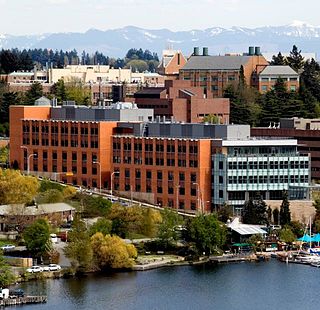
The University of Washington Department of Bioengineering is a joint department between the College of Engineering and the School of Medicine of the University of Washington, located in Seattle, Washington.
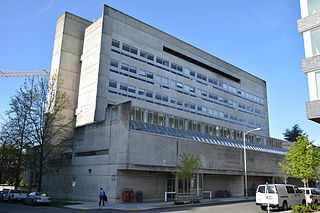
John T. Condon Hall is an academic building of the University of Washington in Seattle, Washington. The building formerly housed the UW School of Law. The hall was named after John T. Condon, the first dean of the School of Law.

The University of Washington School of Social Work is the social work school of the University of Washington, a public research university in Seattle, Washington.
The University of Connecticut (UConn) Neag School of Education offers undergraduate and graduate degrees in education, sport management, and leadership across four campuses, with the main campus located in Storrs, Connecticut. The Storrs location is the main UConn campus and is home to the Renzulli Center for Gifted Education and Talent Development, and additional locations are in Hartford, Waterbury, and Groton. It is ranked number 16 among public graduate schools of education in the nation. The schools' research and teaching programs have been funded by a wide number of institutions, such as the National Science Foundation and the Department of Education.
















